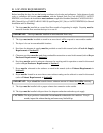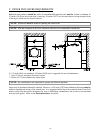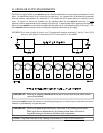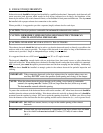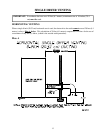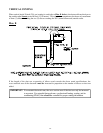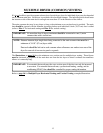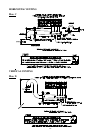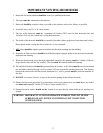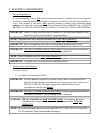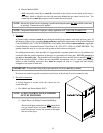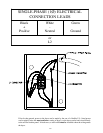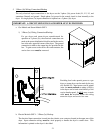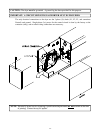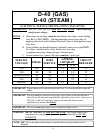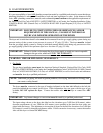
17
IMPORTANT VENTING REMINDERS
1. Ductwork size and installation should be done by a qualified professional.
2. The dryer must be exhausted to the outdoors.
3. Ductwork should be routed as short as possible to the outdoors with as few elbows as possible.
4. Avoid 90° turns, use 30° or 45° turns instead.
5. The size of the ductwork must be a minimum of 8-inches (20.32 cm) for short horizontal runs and
10-inches (25.4 cm) for vertical runs or long horizontal runs.
6. The inside of the ductwork should be as smooth as possible with no projections from sheet metal screws.
Ducts added should overlap the duct to which it is to be connected.
7. ALL ducts should be taped to prevent moisture and lint from escaping into the building.
8. Inspection or clean out doors should be installed throughout strategic points in the ductwork for periodic
inspection and cleaning.
9. Wherever the ductwork passes through combustible materials, the opening must be 2-inches (5.08 cm)
larger than the duct (all the way around). The duct must be centered within this opening.
10. The outside of the ductwork must be protected from the weather. A 90° elbow must be used for horizontal
run and when vertically through a roof by using a 180° turn to point the opening downward. The distance
between the exhaust duct and the nearest obstruction (i.e., roof or ground) must be twice the diameter of
the duct.
11. DO NOT use screens, louvers, or caps on the outside opening of the exhaust ductwork.
12. Exhaust back pressure measured by a manometer at the dryer exhaust duct area must be no less than 0
and must not exceed 0.3 inches (0.74 mb) of water column (W.C.).
13. Exhaust ductwork outlets should not be located in an area directly where make-up air openings are
located.
WARNING: DRYER MUST NEVER BE OPERATED WITHOUT THE LINT FILTER/
SCREEN IN PLACE, EVEN IF AN EXTERNAL LINT COLLECTION
SYSTEM IS USED.



